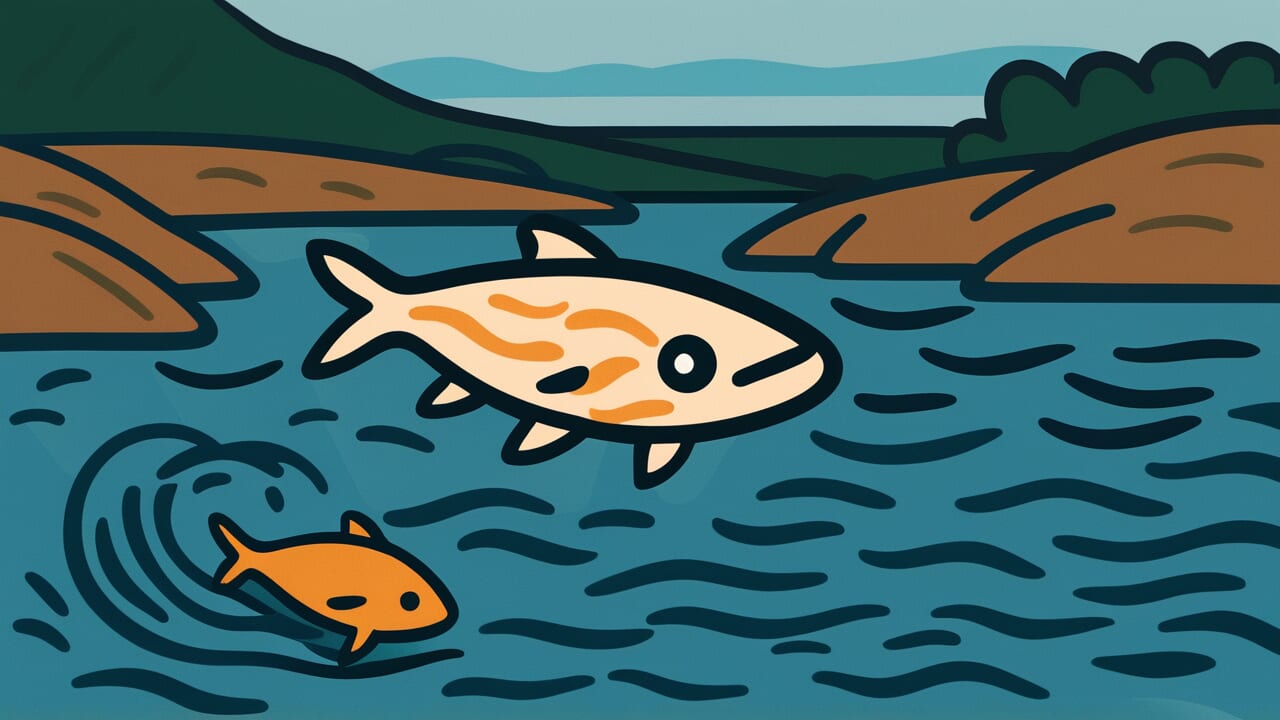How to Read “No big fish in a flowing river”
Nagaregawa ni taigyo nashi
Meaning of “No big fish in a flowing river”
“No big fish in a flowing river” is a proverb that means you cannot achieve great results in a rapidly changing environment.
Just as fish cannot settle in a fast-flowing river and grow large, people cannot focus deeply on their work when situations change constantly.
As a result, it becomes difficult to achieve significant accomplishments or rewards.
This proverb is used to caution people who frequently change jobs, jump from one thing to another, or cannot settle down to focus on one thing.
It teaches that achieving something requires a certain degree of stability and continuity.
In modern times, this saying reminds us of the value of putting down deep roots in one place or field, especially in our rapidly changing era.
It teaches the importance of not being swept away by superficial changes, but instead building essential strength.
Origin and Etymology
No clear written records remain about the origin of this proverb, but we can make interesting observations from its structure.
“Nagaregawa” refers to a fast-flowing river. Japanese rivers are known worldwide for their rapids.
They have geographical features where water rushes from mountains to the sea. In such rivers, the water flows violently and the riverbed environment constantly changes.
“Taigyo” means a large, fully-grown fish. For fish to grow large, they need a stable environment, abundant food, and time.
Freshwater fish like carp and crucian carp need calm pools or pond-like places to grow properly.
This proverb likely originated from years of observation by fishermen and people living near rivers.
They had the practical knowledge that fish cannot settle easily in rapids, and large fish hide in calm waters.
This natural observation eventually became a lesson for human society.
It expressed the universal truth that producing great results while building strength is difficult in rapidly changing environments, using river ecosystems as a metaphor.
Usage Examples
- He has changed jobs five times in three years, but “no big fish in a flowing river”—he has only achieved mediocre results everywhere
- Rather than jumping into new businesses one after another, you should deepen your current work—”no big fish in a flowing river,” as they say
Universal Wisdom
The proverb “No big fish in a flowing river” touches on a deep truth about human growth and success.
We sometimes mistakenly believe that change itself has value. New environments, new challenges, new possibilities—these are certainly attractive.
But true growth is difficult amid constant change.
Great achievements are the crystallization of efforts accumulated over time. You cannot harvest immediately after planting seeds.
Roots must grow deep, trunks must thicken, and branches must spread. All of this requires time.
The same applies to humans. By steadily accumulating experience in one place and one field, you develop deep expertise and insight that no one else can imitate.
Superficial knowledge and skills can be acquired even amid change. But the ability to see essence, the perseverance to overcome difficulties, and a trustworthy character—these grow only in stable environments.
This proverb has been passed down for generations because humans instinctively have the urge to “get quick results” and “jump at new things.”
It cautions against that impulse and reminds us of the value of settling down patiently. That is the wisdom of our ancestors.
When AI Hears This
For fish to maintain their position in a fast-flowing river, they must continuously resist water resistance.
What matters here is that resistance is proportional to cross-sectional area, while fish mass is proportional to volume.
When body length doubles, cross-sectional area increases fourfold, but volume increases eightfold. Large fish may seem advantageous at first glance, but actually the opposite is true.
In high-velocity environments, turbulence occurs and vortices continuously form near the fish’s body surface.
Generating these vortices consumes enormous energy, which fluid dynamics calls “energy dissipation.” Larger fish have greater surface area, so dissipated energy also increases.
Furthermore, when flow velocity doubles, energy loss quadruples—a square law effect.
Meanwhile, energy that fish can obtain from food is limited. In fast-flowing places, food also gets swept away easily, and there is no time for leisurely feeding.
As a result, large fish fall into “deficit management” where energy consumption exceeds income.
Calculations suggest that a 50-kilogram fish staying stationary in a river flowing at 2 meters per second would need several times its body weight in food daily.
In other words, the absence of large fish in rapids is not coincidental—it is evidence that physical laws of energy balance govern ecosystems.
Lessons for Today
What this proverb teaches modern people is the essential value of “selection and concentration.”
Modern society is overloaded with information, and new options constantly appear before us.
Open social media and you see an endless stream of success stories and new trends. In such circumstances, it is natural to question where you are and what you are doing, wondering if there might be something better.
However, this proverb teaches us: if you want to obtain something truly valuable, have the courage to put down roots in one place.
This does not mean staying blindly. It means digging deep in the place you have chosen, understanding the essence, and creating unique value.
The place where you are now may hold undiscovered possibilities. Before seeking superficial change, try finding something only you can do in your current environment.
Rather than surrendering to the flow, settle down by your own will. That choice is the first step toward your significant growth.



Comments